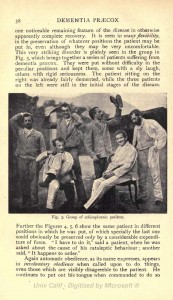Emil Kraepelin (1856-1926) led the way for psychiatric research in the nineteenth century. Educated and trained in Germany, Kraepelin studied mental disorders and eventually developed a system of classifying mental illness that took into account a condition’s onset, course, and prognosis.
Kraepelin grouped conditions/illnesses by patterns of symptoms, rather than by the symptoms themselves. He called this a “clinical” rather than “symptomatic” view. Kraepelin’s distinction was important, because almost any single symptom could be seen across a broad spectrum of mental conditions. Classifying by pattern, (or syndrome) rather than symptoms led to a simpler and more uniform diagnostic system.
Kraepelin identified the pathological basis of Alzheimer’s disease, identified schizophrenia (though he named it dementia praecox), and manic depression.
________________________________________________________

